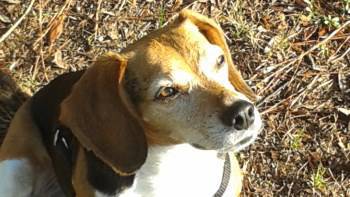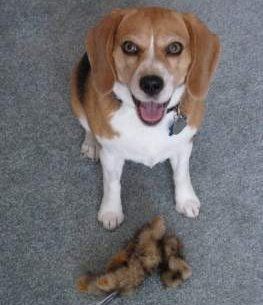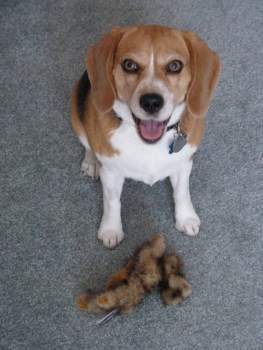Senior Beagles
Senior Beagle Overview
The Beagle is considered a senior dog approximately at the age of 9. However, this is not set in stone. A particular dog may be deemed senior anywhere between 8 and 12.
How is this determined? By the health, activity level and behavior of the dog. However, independent of this, the Beagle should begin having geriatric vet appointments at age 9.
We receive a lot of questions from owners who are concerned about the declining abilities of older Beagles...and wonder how to keep their once young and active dog happy and healthy as a senior.
Let's discuss what this entails and how to know your Beagle is truly growing older.
Please note:
BeaglePro is reader-supported, and some of the product suggestions on this page are affiliate links. As an Amazon Associate we earn from qualifying purchases. This is at no extra cost to you and helps us keep this site running.
Geriatric Exams
The purpose of a geriatric exam for your Beagle will be for the veterinarian to have an overall view of your dog's health and plan for the future years of aging. A geriatric exam for the aging Beagle will include:
An Extended Physical Exam - The vet should do a thorough exam of your Beagle's eyes, ears, teeth and gums, heart, lungs, abdominal organs, muscles, bones, nervous system, and skin.
It should be discussed what to expect and what to watch for in each of these areas as your dog gets older.
Daphne Olivia Gwenivere | Owner: Gloria Alkins | 11 years old
Nutritional needs should be talked about, as well as the importance of managing your dog's
weight at at a healthy level.
Complete Blood Count (CBC) -This blood test measures the 3 types of blood cells--red, white, and platelets.
The red blood cells are measured, screening for diseases such as anemia. The test also looks at the dog's white blood cells, which can show possible disease immune system issues. Platelets are also looked at, these are the cells responsible for blood clotting. They are counted to make sure that there are enough.
Chemistry Profile - This blood test looks at the Beagle's liver and kidney function. Blood glucose level is evaluated, to screen for diabetes, which is a common health issue for the senior Beagles.
Heartworm Antigen Test - This very accurate blood test acts to ensure the effectiveness of the heartworm prevention medication. This is because after being given treatment for almost a decade, a dog can build up immunity to certain medications. Your vet may find that there is a need to switch to a new brand that will work better.
Fecal Flotation - You will be asked to bring in a stool sample for evaluation. This is used to look for intestinal parasites which the older Beagle is more susceptible to.
Urinalysis - You should be asked to bring in a urine sample from your Beagle. As it is usually done with humans, your dog's vet should want a sample of the 1st urine of the morning. This will be evaluated to check for any kidney issues.
As a side note, it is much easier to collect a sample first thing in the morning, because a dog's bladder will be full and he/she will be less likely to be skittish when you collect the urine. The vet will give you a sterilized container; once there is a steady stream, calmly approach from the back (female) or side (male) and hold it under the stream.
X-Rays - X-rays of the chest allow evaluation of the heart, lungs, and membranes lining the thoracic cavity. The size of the heart and its chambers is assessed. The lungs are screened for normal aging changes.
Changes to Expect
Changes in Hearing
-You can tell if you dog's hearing isn't as sharp as it used to be if he doesn't respond to his name or verbal commands; in some cases, a dog that is having trouble with hearing may bark more than normal.
As your dog approaches the 8 to 9 year mark, it is suggested to begin using hand commands along with verbal commands; this may be helpful down the line.
For older Beagles that have hearing issues, it may be easy for them to become startled if they do not hear people approaching; it is best to be in their line of sight as you come up to them.

Prince, 9 years old
Photo courtesy of owners: Bernie and Mary Ann Swider
Changes in House Training - The senior Beagle may begin to have trouble holding their bladder or bowel. This can be causes by kidney problems, diabetes, hormonal imbalances or simply because of a weakening of the bladder or bowel muscles.
It is best to keep a very easy access to the outdoor bathroom area, bring your older dog outside more often.
In extreme cases, you will find that the very old Beagle will need canine diapers. This is a good method, as a Beagle that keeps having accidents inside the home can lose self confidence. While one may quickly assume that wearing a doggie diaper is “embarrassing” for the dog; this is not true, as many dogs seem to prefer this to the shame of soiling indoor areas.
Tip:
If your dog is urinating a lot more but also drinking excessively, this can be a sign of canine diabetes or kidney problems and is something to report to your dog's veterinarian right away.
Changes in Eating Habits - An older dog is more likely to develop tooth and gum conditions. And because of sore gums or loose teeth, he may let food drop out of his mouth or even refuse to eat.
It is very important to perform dental care
from day 1 of bringing your Beagle home. However, even if you ignored dental care then, begin right away. Speak to your vet about a dental exam; he will let you know if your senior Beagle can handle the light sedation that is done with 'full dentals', in which x-rays are taken to look for decay and infection, along with a cleaning and scraping.
The Senior Beagle should now be switched to a high quality senior dog food, which should be softened with warm water or warm low-sodium chicken broth if the dog has missing or sore teeth.
Vision - As a Beagle ages, a bluish tint may develop over his eyes. In many cases this is normal and does not affect vision.
However, one of the 1st symptoms of cataracts is a whitish color tint over the eyes; and only some dogs will have additional symptoms such as red, bloodshot eyes. For this reason, any clouding of your dog’s eyes should be examined by your Beagle’s veterinarian.
Weight Gain or Loss - As your Beagle ages, his or her metabolism will slow down. At the same time, your dog will not be able to run around and exercise as they used to as a puppy or young adult.
For this reason, weight gain is common. Unless you dog has health issues which prevent it, exercise
should be provided; walk at a slower pace and perhaps cut down the distance walked if needed; however do not stop all together.
Skin and Coat - Often with older dogs, the skin thickens and loses elasticity. It's a good idea to check for large lumps on or under the skin. This could be a sign of a tumor, cyst or cancer. Use a gentle dog shampoo and thick, rich dog conditioner. Brush more gently when grooming.
Sleep
- As a Beagle grows older, there will be a decrease in activity and your dog may want to nap more than usual. This is normal. He or she may tire out when playing. It is recommended to follow your dog’s cues for “when enough is enough” and allow your dog to rest as needed.
It is highly suggested to obtain an orthopedic dog bed, as these offer great relief to an older dog’s stiff muscles, aches and pains. Sleeping areas should be reassessed to ensure that they are not near drafts or receive glaring light from windows, as seniors will be much more sensitive to these elements.
Nails -
When a dog is active, as he walks around on different types of surfaces, his nails are naturally 'filed' down to a certain extent and then owners clip as needed (every 3 to 6 weeks). However, as a dog ages, he is typically less active than his younger counterparts and this means that the nails may need to be clipped more often.
Senior dogs tend to have more brittle nails as well, and without more frequent attention to their growth they may split and crack which can be quite painful. Be sure to check them more frequently; most senior Beagles need a slight nail clippings every 2 to 3 weeks.
Pad paws
- The pads of an older Beagle may thicken and this also is due to decreased activity. In addition, paws may become more sensitive to rough surfaces and temperatures. Using a quality paw wax like Musher's Secret Paw Protection Wax
 can give a senior Beagle better traction and protect from hot/cold ground and pavement.
can give a senior Beagle better traction and protect from hot/cold ground and pavement.




